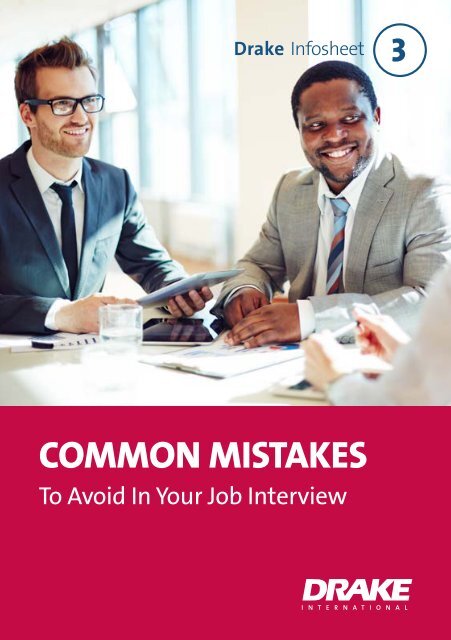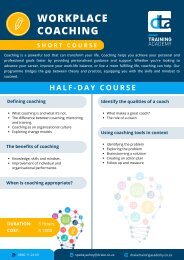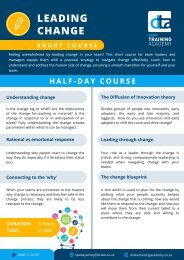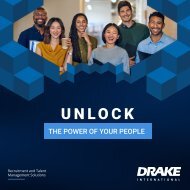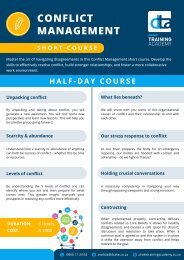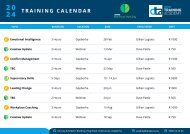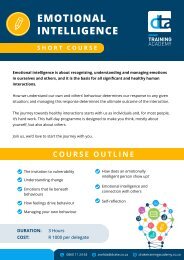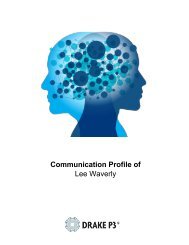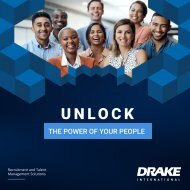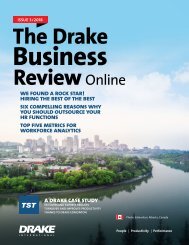Common Mistakes To Avoid In Your Job Interview UK
We share tips on common mistakes people make in their interviews - to help you avoid the same pitfalls.
We share tips on common mistakes people make in their interviews - to help you avoid the same pitfalls.
Create successful ePaper yourself
Turn your PDF publications into a flip-book with our unique Google optimized e-Paper software.
Drake <strong>In</strong>fosheet<br />
3<br />
COMMON MISTAKES<br />
<strong>To</strong> <strong>Avoid</strong> <strong>In</strong> <strong>Your</strong> <strong>Job</strong> <strong>In</strong>terview
Don’t Fall <strong>In</strong>to These<br />
<strong>In</strong>terview Traps<br />
It’s tough to avoid interview traps<br />
if you don’t know what they are.<br />
Here are a few to watch out for.<br />
1. Confusing an <strong>In</strong>terview with an <strong>In</strong>terrogation<br />
Most candidates expect to be interrogated. An interrogation occurs when one person asks<br />
all the questions and the other gives the answers. An interview is a business conversation<br />
in which both people ask and respond to questions. Try to establish a rapport with the<br />
interviewer. Use their questions to develop a relationship and adapt to their individual<br />
interview style. Candidates who expect to be interrogated avoid asking questions, leaving<br />
the interviewer in the role of reluctant interrogator. Thoroughly researching the company<br />
in advance will enable you to offer strategic answers and ask informed questions.<br />
2. Making a So-Called Weakness Seem Positive<br />
<strong>In</strong>terviewers frequently ask candidates, “What are your weaknesses?” Conventional<br />
interview wisdom dictates that you highlight a weakness like “I’m a perfectionist,” and<br />
turn it into a positive. <strong>In</strong>terviewers are not impressed, because they’ve probably heard the<br />
same answer a hundred times. If you are asked this question, highlight a skill that you<br />
wish to improve upon and describe what you are doing to enhance your skill in this area.<br />
<strong>In</strong>terviewers don’t care what your weaknesses are. They want to see how you handle the<br />
question and what your answer indicates about you.<br />
3. Failing to Ask Questions<br />
Every interview concludes with the interviewer asking if you have any questions. The worst<br />
thing to say is that you have no questions. It shows that you are not interested and not<br />
prepared. <strong>In</strong>terviewers are more impressed by the questions you ask than the selling points<br />
you try to make. Before each interview, make a list of five questions you will ask. “I think a<br />
good question is, ‘Can you tell me about your career?’” says Kent Kirch, director of global<br />
recruiting at Deloitte. “Everybody likes to talk about themselves, so you’re probably pretty<br />
safe asking that question.” For more information on appropriate questions to ask during an<br />
interview, read Drake <strong>In</strong>fosheet 4: “Asking the Right Questions”.
Drake <strong>In</strong>fosheet<br />
3<br />
4. Researching the Company But Not <strong>Your</strong>self<br />
Candidates intellectually prepare by researching the company. Most job seekers do not<br />
research themselves by taking inventory of their skills, knowledge and experience.<br />
Formulating a “talent inventory” prepares you to immediately respond to any question<br />
about your experience. You must be prepared to discuss any part of your background.<br />
Creating a “talent inventory” refreshes your memory and helps you immediately remember<br />
experiences you would otherwise have forgotten during the interview.<br />
5. Leaving <strong>Your</strong> Mobile Phone On<br />
We may live in a wired, always-available society, but a ringing mobile phone is not<br />
appropriate for an interview. Turn off your mobile phone before you enter the company.<br />
6. Waiting for a Call<br />
Time is your enemy after the interview. After you send a thank you email and note to<br />
every interviewer, follow up a couple of days later with either a question or additional<br />
information. Contact the person who can hire you—not the HR department. They are very<br />
busy and often cannot return your call in a timely fashion. Additional information can be<br />
an update on any recent achievements, a current competitor’s press release or industry<br />
trends. Here’s an example, “I saw an article that featured your company as a leader in the<br />
industry. I thought you would be interested.” <strong>Your</strong> intention is to keep everyone’s memory<br />
of you fresh.<br />
7. Arriving Late<br />
It is extremely important that you arrive to the interview on time. Even better though, try<br />
to be 5 to 10 minutes early. Arriving late shows disorganisation and immediately gives the<br />
interviewer a negative first impression.
Don’t Fall <strong>In</strong>to These<br />
<strong>In</strong>terview Traps!<br />
UNITED KINGDOM<br />
GLOBAL OFFICES<br />
LONDON<br />
PURFLEET<br />
AUSTRALIA<br />
PHILIPPINES<br />
CHESTERFIELD<br />
STAMFORD BRIDGE<br />
CANADA<br />
SINGAPORE<br />
PICKERING<br />
WEMBLEY<br />
HONG KONG<br />
SOUTH AFRICA<br />
PLYMOUTH<br />
YORK<br />
NEW ZEALAND<br />
UNITED STATES<br />
0800 111 4558<br />
WWW.DRAKEINTL.CO.<strong>UK</strong>


